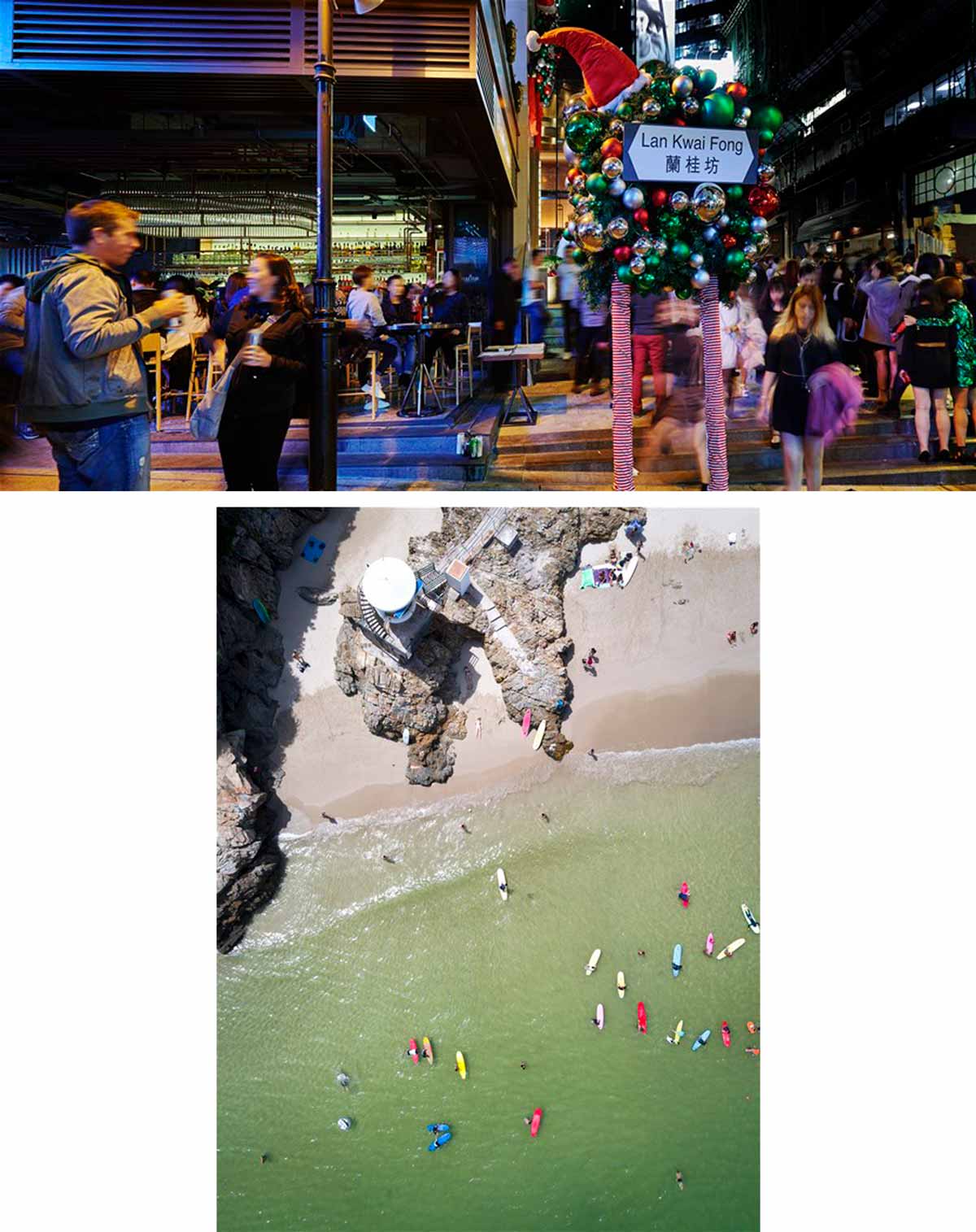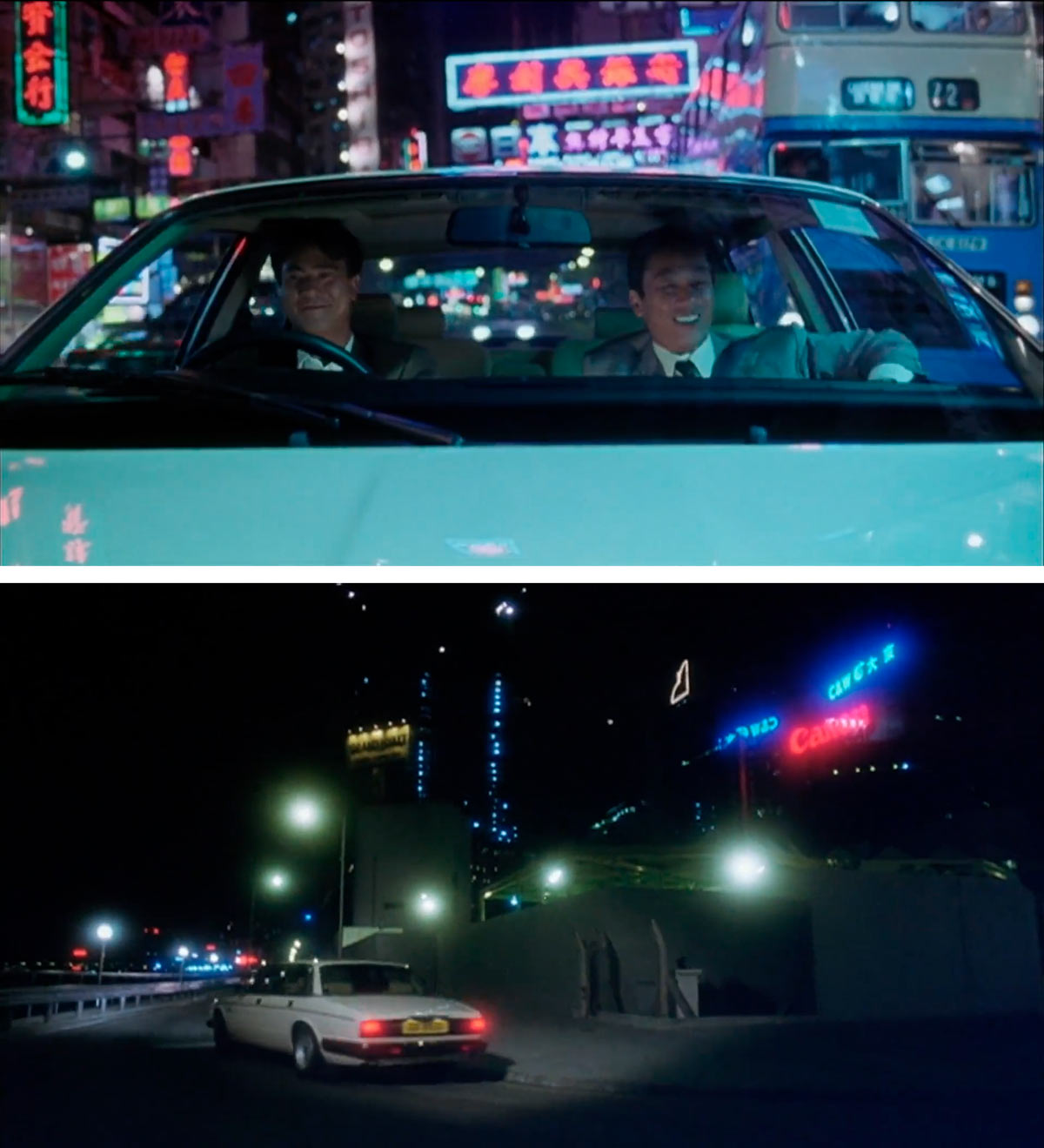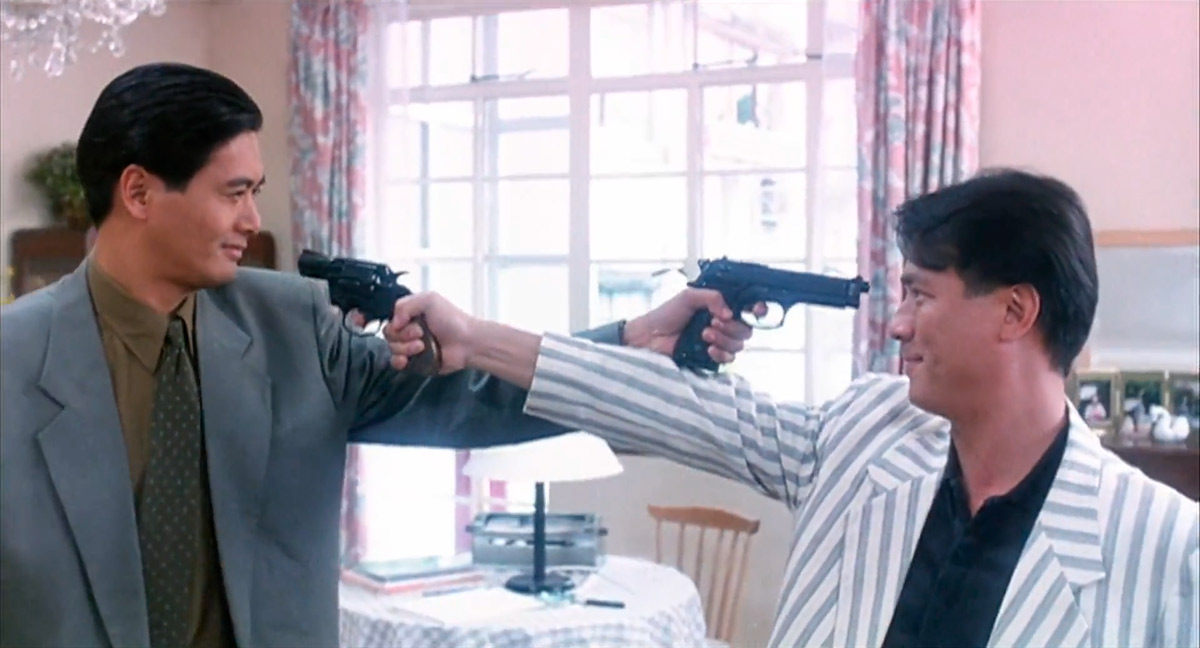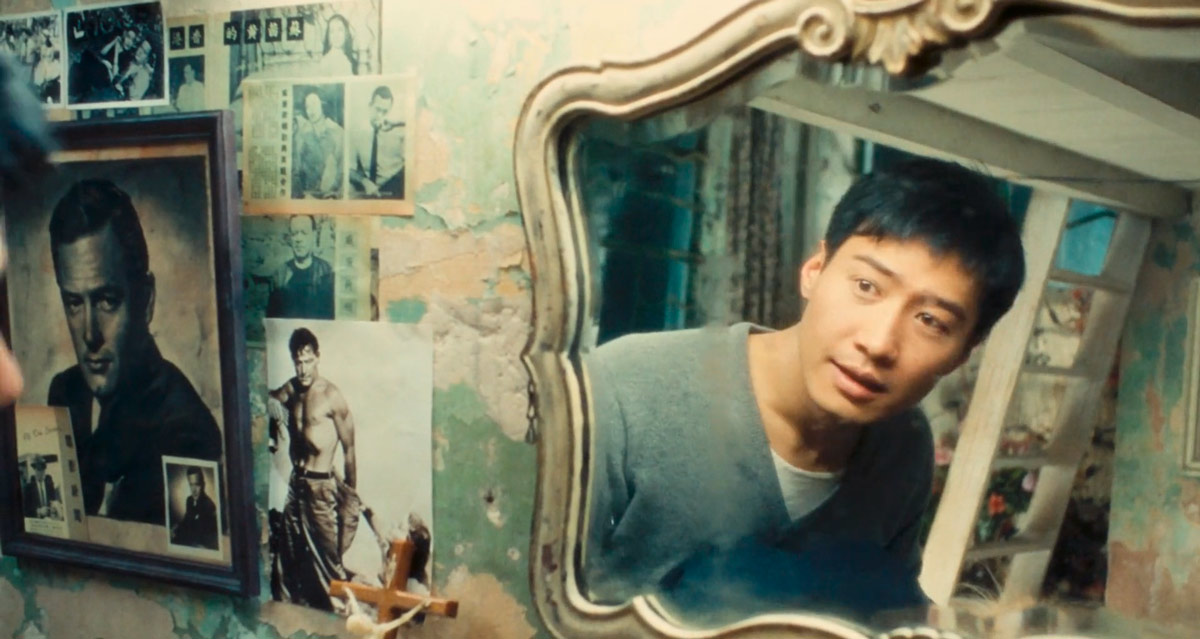Hong Kong, also called by Vietnamese with another endearing name: Huong Cang, is an iconic location that is so familiar with Generation X during the late 80s, early 90s in Vietnam. The city was featured in so many classic local movies that thanks to them, viewers in Vietnam were introduced to Kowloon and Mongkok with streets lit up by colorful neon lights, the busy financial area in the Central District, the splendid downtown Lan Kwai Fong, and the serene fishing village of Tai O.

Saying the golden era of Hong Kong movies represented a young, wild, free and pure entertainment for many Vietnamese people back then is not an overstatement. As the quote from the film entitled “2046” (directed by Wong Kar-wai) goes, "All memories are traces of tears” - it’s bittersweet knowing those good old days are now just memories.
Perhaps what Hong Kong filmmakers manifested back then is something timeless. Even until now, the aesthetic impact of Hong Kong cinemas and culture can still be found in many recent projects of many young Vietnamese creatives.
Eat, sleep and breathe with Hong Kong cinema
The late 1980s and early 1990s were considered as the golden age of Hong Kong cinema and television — an indispensable “chicken soup for the souls'' of many young people of that era.
Each Vietnamese youngster who loved Hong Kong movies and TVB series would pick one, or a few, idol(s) to worship (or to “stan”, in GenZ’s language). Fans of the gangster movie genre would never forget Chow Yun-fat — the invincible hero who was extremely skillful with his guns and pulled off his shades, toothpick, and leather coat combo every single time. Then there was the iconic duo Andy Lau and Tony Leung Chiu-wai, or Leslie Cheung, Leung Ka-fai, and of course, the beautiful Maggie Cheung, Joey Wong, and Cherie Chung.
Besides, comedies would have never been the same without the hilarious voice of Van Son (a Vietnamese actor), who dubbed so many characters of Stephen Chow — the comedian king of Hong Kong cinema.

Without a doubt, these names went down to history and are forever remembered as the heroes and heroines of that generation. We eat, sleep, breathe with Hong Kong cinema and fall in love with our idols, our first celebrity crushes, who were living thousands of miles from us. They're far away but we got to see them up close right in our room through our thick 14-inch TVs every night.

Interestingly, to many people in Vietnam who have never set foot in Hong Kong, they tend to know all the places that appeared countless times in those movies and series like the back of their hand. From exciting locations like Kowloon, Mongkok, Tsim Sha Tsui, Sham Shui Po, Central District, Stanley, to more subtle, quiet regions such as Wanchai, Tai O. We knew them so clearly as if they were districts around Saigon.
At what point did we feel so close to those destinations without setting foot in Hong Kong? In Vietnamese, we have a term (that is widely used today) “Hồng Kông bên hông Chợ Lớn”, which expresses the familiarity of Hong Kong to Vietnamese people.

Today, Vietnamese tourists often visit the Avenue of Stars, which honors celebrities of the Hong Kong film industry; or the administrative area of West Kowloon that has been featured in numerous films and series; and it is impossible not to mention Lan Guifang - the famous entertainment area of Hong Kong youth, where a three-part erotic series of the same name took place in.

As a journalist, every trip to Hong Kong is nostalgic to me. I would go like “Oh, this movie was filmed right here!” Like the time I was in Mongkok, where they filmed “As Tears Go By” (the first movie directed by Wong Kar-wai), I couldn’t stop thinking about that heartbreaking scene when Ngor (Maggie Cheung) said goodbye to Wah (Andy Lau). In her eyes, as she was watching him walk away, she knew he would never come back to her again. Never.

Though Hong Kong cinema has seen better days, it doesn’t mean its journey has to come to an end. Recently, “Better Days”, a new Hong Kong film directed by Derek Tsang, landed a 2021 Oscar nomination for the Best International Film category. Being the son of Eric Tsang, one of the greatest Hong Kong actors, Derek is seen as a force to be reckoned with as he continues the legacy of his father’s legacy, as well as that of Hong Kong cinema.
All memories are traces of tears
Younger generations in Vietnam might find the bloom of Hong Kong cinema not that relatable to them. But it’s fair to say it was just as thriving and popular as K-dramas in the last 20 years.
Hong Kong back then was known as the “capital” of the Asian cinema industry, just behind Hollywood in the US and Bollywood in India.
The world got to see a generation of talented filmmakers who had such unique aesthetics and mastered the art of storytelling such as John Woo, Wong Kar-wai, Ann Hui, Johnnie To, Derek Yee, just to name a few. On top of that, what a wonderful time it was when audiences were introduced to the most gorgeous, talented, incomparable troop of actors and actresses.

Some of them are still diligently working with recent projects, and even at the age of 50s, they are still succeeding as leading roles over the last 30 years. Audiences have never got enough of them and are still looking forward to their next come-back.
In the last four decades, Andy Lau has still consistently remained his stardom. His feature in Shock Wave 2, a massive blockbuster in China released in late 2020, is proof that he’s aged as a fine wine. It’s hard to believe that an actor at his age is still doing most of the stunts in his film!
We haven’t been able to see much of Tony Leung Chiu-wai on screen these days, especially after he reached the peak of his career. Worry not, Tony is said to be working on major productions at the moment, including playing a villain role in a Marvel’s project Shangchi And The Legend Of The Ten Rings, making him the first Hong Kong born actor in the MCU.
And unfortunately, we have had to say goodbye to some of the greatest actresses and actors of Hong Kong cinema (Leslie Cheung, Anita Mui) as they forever pass onto the next spiritual realm. While the others have retired from acting (Maggie Chung, Joey Wong, Cherie Chung, etc.) and settled into their private and quiet lives.
However, their legacy and contribution to the silver screen industry during their younger days will remain timeless as remnants of the glorious past.
I could spend the whole day talking about how much I love each of the people mentioned above, but in this humble article, I would like to express my admiration to the three of my most favorite and wonderful filmmakers of the Hong Kong cinema industry.
John Woo

When it comes to action movies with gangsters and mobs, John Woo is always the first director that pops up in my head.
To me, John Woo’s movies can be described by this quote: “In the world of black and white, there’s a gray area. Some of us have more of it than the others, some have less”.
John Woo’s filmmaking journey mainly explored that “gray area”, where the line between good and bad doesn’t exist, where the angels and devils co-exist in one single place.
Hong Kong, through his lens was chaotic yet peaceful, was like a quiet sea surface hiding deathly undertows. And in that “gray area”, humanity in brotherhood and friendship throws a lifeline to his characters and pulls them toward a better place, even though the journey might cost them tears and blood.

John Woo is known for his one-of-the-kind cinematic language, which is full of graceful slow-motion scenes alongside thrilling gunfights.
You would also find his characters struggling in “Mexican standoff” situations. These features are just too unique and personal that no one can copy from him even if they want to.
“A Better Tomorrow” 1 & 2 (1986, 1987), “The Killer” (1989), and “Hard-Boiled” (1992) are just three of his most unforgettable creations — his masterpieces.

With these three action movies, John Woo’s reputation reached out of his motherland’s border to European countries and the US, making him the first successful filmmaker from Hong Kong in Hollywood with lots of blockbusters.
Unfortunately, the quality of his latest works is gradually declining.
Martin Scorsese once shared his point of view about individuality in cinema “From an audience’s perspective, I believe the more unique and individual a film is, the more chances it has to be considered as a work of art.”

On that note, when talking about the difference between two directors John Woo and Joel Schumacher, Martin said that even when both of them had the expertise in action films, only John Woo could inject successfully the individuality into his works, making them extremely interesting.
According to Martin, John Woo stands out among other filmmakers who rely too much on textbook techniques and technologies, which can be a huge deal-breaker when it comes to genuine cinema.
Up to this day, John Woo still continues making films, in both Hollywood and Hong Kong. Even though his reputation is not the same as before, audiences can still recognize the John Woo-ism in his recent movies: slow-motion footage, epic gun fights with bullets shot from everywhere, pigeons flying through a fiery explosion. After more than 5 decades of performing arts in different environments, he remains loyal to his personal style as it gorgeously comes full circle.
Peter Chan

The next wholesome director I'd like to introduce successfully contributed so many great films to Hong Kong cinema since the 90s — Peter Chan.
Despite being a student of an American film school and producing a few movies in Hollywood, he’s better known for his contribution to the Hong Kong film industry.
The must-watch-Peter-Chan-directed-movie list includes “He’s a Woman, She’s a Man” (1994, starring Leslie Cheung, Carina Lau), “Comrades: Almost a Love Story” (1996, starring Maggie Cheung, Leon Lai), “Perhaps Love” (2005, starring Takeshi Kaneshiro, Sun Na, Jacky Cheung, Ji Jin-hee), “The Warlords” (2007, Jet Li, Andy Lau, Takeshi Kaneshiro), and “Dearest” (2014, starring Zhao Wei).
Although being successful with a varied collection of genres, from comedy, epic, musicals, to psychology, horror, or action, romantic films are still his strongest suit.
“Secret” and “Perhaps Love” are even considered equivalent to Wong Kar-wai’s romantic films. These two iconic creations of Peter Chan have not just won the audiences’ hearts for years, but also been a loving reminder of the good old days of Hong Kong cinema.

At the beginning of the film, we see Li Xiao-Jun (Leon Lai) half-asleep on the ship departing from China to Hong Kong. Soon, the naive migrant was overwhelmed by how exciting, lively, and lavish Hong Kong was. Interestingly, this scene is “repeated” at the end as the movie comes in a full circle. This was Peter’s impeccable manifestation of the idea about designated fate.
The whole story starts in 1986 and ends in 1995 with Xiao-Jun and Li Qiao fatefully meeting each other in front of an electronic store that has a display television playing a music video by Teresa Teng after news of the singer's death had broken.

An excellent film is one that is made of an amazing combination of different details and each of them is also individually amazing. That could be Li Qiao’s tears for losing her love, or when Li Xiao-Jun runs up and down in New York streets looking for his long-lost lover because he’s just seen Li Qiao’s silhouette flashing by.
And to me, the most powerful scene must be the goodbye kiss of Li Qiao and Li Xiao-Jun. After he has brought his wife Fang Xiaoting from China to Hong Kong and she has also settled with her husband (a mob boss named Ouyang Pao), they know they can’t be together anymore even though their love for each other is real. He gets out of the car, she keeps watching him leave. On the back of his jacket, there is the autograph of their favorite singer Teresa Teng he just got not so long ago. She drops her head on the honk. What an awful sound it makes. But then he turns around. As the camera is aiming at the rearview mirror, we can see Li Qiao in confusion and Li Xiao-Jun coming toward the car, closer and closer. And just that, despite the crowded street, nothing can stop them now, no morality can tear them apart at this moment. She leans out of the window, he’s on his knees. And just like that, they exchange one of the most passionate kisses in the history of cinema that represents the love they had to hide all this time.
As the camera slowly spins and shifts to a wide top shot, it feels as if there’s nothing left in this world but the two of them and their kiss.

Wong Kar-wai

Last but definitely not the least, this Hong Kong filmmaker is known for his impeccable consistency throughout his works, also praised as “The King of Romance” - Wong Kar-wai.
Born in Shanghai, Wong Kar-wai spent most of his life in Hong Kong after moving with his family in the mid-60s. This is the reason why the image of Hong Kong during the 1960s is often found in his films as homage to his childhood environment.

“As Tears Go By” (1988) is Wong’s first directed film and also the most financially successful. Although this film was not considered as competent as the other popular mafia movies released in the era, it served as a vivid example of Wong-ism in Hong Kong cinemas.
Besides the story about gangster brotherhood, the bloody massacres, the self-destruction of those who can’t find their way out of crimes, what we also get in his films is the sentimental element expressed through the protagonist couples.
Spoiler alert! There was not a single happy ending in any of Wong’s films. That’s the rule. This tragic theme can be seen in “As Tears Go By”, “Days of Being Wild”, “Chungking Express”, “Ashes of Time”, “Falling Angels”, “Happy Together”, and especially in “In The Mood for Love” and “2046”.

Not only in Asia, Wong Kar-Wai 's filmmaking style has also influenced Western film makers. His storytelling techniques applied for unlucky love affairs, or his signature use of lights and colors to showcase a character’s inner thoughts can be spotted in lots of recent films, including Moonlight (Oscar 2017’s Best Picture) directed by Barry Jenkins.
Once you’ve entered Wong’s cinematic world, be prepared to catch feelings and lots of painful quotes, like “Love is strange. How could such a magical thing hurt so bad?” or “The harder I try to forget, the deeper I remember”.
Wong Kar-wai has taken tears from so many generations of audiences through his creations of poetic torments and somber atmosphere. Just like Chow Mo-wan said in “2046”, "All memories are traces of tears”, no matter how many times you have watched his movies, each time will be a nostalgic and emotional trip.
Adapted by L A M.




